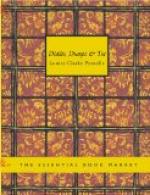After the marriage, the darkies adjourned to the barn to dance. Diddie and Dumps begged to be allowed to go and look at them “just a little while,” but it was their bedtime, and Mammy marched them off to the nursery.
About twelve o’clock supper was announced, and old and young repaired to the laundry. The room was festooned with wreaths of holly and cedar, and very bright and pretty and tempting the table looked, spread out with meats and breads, and pickles and preserves, and home-made wine, and cakes of all sorts and sizes, iced and plain; large bowls of custard and jelly; and candies, and fruits and nuts.
In the centre of the table was a pyramid, beginning with a large cake at the bottom and ending with a “snowball” on top.
At the head of the table was the bride-cake, containing the “ring” and the “dime;” it was handsomely iced, and had a candy Cupid perched over it, on a holly bough which was stuck in a hole in the middle of the cake. It was to be cut after a while by each of the bridesmaids and groomsmen in turns; and whoever should cut the slice containing the ring would be the next one to get married; but whoever should get the dime was to be an old maid or an old bachelor.
The supper was enjoyed hugely, particularly a big bowl of eggnog, which so enlivened them all that the dancing was entered into with renewed vigor, and kept up till the gray tints in the east warned them that another day had dawned, and that Christmas was over.
But you may be sure that in all Christendom it had been welcomed in and ushered out by no merrier, lighter hearts than those of the happy, contented folks on the old plantation.
CHAPTER III.
Mammy’s story.
One cold, rainy night a little group were assembled around a crackling wood fire in the nursery; Mammy was seated in a low chair, with Tot in her arms; Dumps was rocking her doll back and forth, and Diddie was sitting at the table reading; Aunt Milly was knitting, and the three little darkies were nodding by the fire.
“Mammy,” said Dumps, “s’posin’ you tell us a tale.” Tot warmly seconded the motion, and Mammy, who was never more delighted than when astonishing the children with her wonderful stories, at once assumed a meditative air. “Lem me see,” said the old woman, scratching her head; “I reckon I’ll tell yer ’bout de wushin’-stone, ain’t neber told yer dat yit. I know yer’ve maybe hearn on it, leastways Milly has; but den she mayn’t have hearn de straight on it, fur ’taint eb’y nigger knows it. Yer see, Milly, my mammy was er ‘riginal Guinea nigger, an’ she knowed ‘bout de wushin’-stone herse’f, an’ she told me one Wednesday night on de full er de moon, an’ w’at I’m gwine ter tell yer is de truff.”
Having thus authenticated her story beyond a doubt, Mammy hugged Tot a little closer and began:
“Once ’pon er time dar wuz a beautiful gyarden wid all kind er nice blossoms, an’ trees, an’ brooks, an’ things, whar all de little chil’en usen ter go and play, an’ in dis gyarden de grass wuz allers green, de blossoms allers bright, and de streams allers clar, caze hit b’longed to er little Fraid, named Cheery.”




